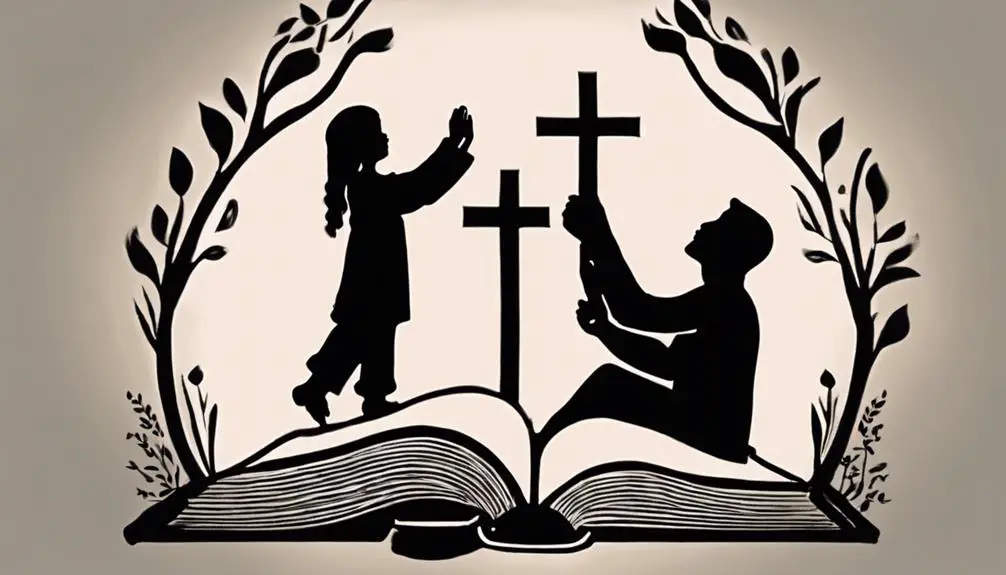Find out why respecting your parents is deeply rooted in Christian faith, as examined through key Bible verses.

What Bible Verse Talks About Respecting Your Parents
Did you know that honouring your parents is so important it's one of the Ten Commandments? Exodus 20:12 says, 'Honor your father and your mother, so that you may live long in the land the Lord your God is giving you.'
This is not an isolated teaching, but a theme echoed throughout the Bible. Why is this respect so central to the Christian faith? It's a thought-provoking question that could lead us on an interesting journey through scripture.
Key Takeaways
- Exodus 20:12 and Deuteronomy 5:16 command honoring parents as part of the Ten Commandments, promising longevity and prosperity.
- Proverbs 1:8-9 and 23:22 highlight respect for parents as crucial for personal development and societal balance.
- Ephesians 6:1-3, written by Apostle Paul, emphasizes obedience to parents and correlates it with a blessed life.
- In Christianity, respecting parents symbolizes respect for God, fostering a deeper spiritual connection, according to Christ's teachings.
Biblical Commandments on Respect

While delving into the core of biblical teachings, you'll find that respect for parents isn't merely a suggestion, but a commandment explicitly outlined in the scriptures. In fact, this mandate isn't tucked away in some obscure corner of the text, but is prominently featured in the Ten Commandments, implying its critical importance.
The commandment, 'Honor your father and your mother,' is clearly stated in Exodus 20:12 and Deuteronomy 5:16. However, the concept of respect doesn't stop at mere obedience. The original Hebrew word for 'honor' is 'kabed,' which also denotes adding weight or significance. Therefore, it's not just about complying with parental wishes, but providing them with significance and esteem.
Moreover, it's important to note that the Bible pairs this commandment with a promise of longevity. This isn't a random correlation. It's a deliberate, cause-and-effect relationship, implying that respectful behavior towards parents has tangible, positive outcomes. In essence, respecting parents isn't just a moral obligation but also a path to a prosperous life.
Interpretation of Exodus 20:12

Taking a closer look at Exodus 20:12, you'll find an intriguing depth of meaning that goes beyond a mere command to respect your parents. This verse actually says, 'Honor your father and your mother, so that you may live long in the land the Lord your God is giving you.'
Interpreting this verse, you'll notice two significant components: a command and a promise. The command – 'Honor your father and your mother' – doesn't simply mean obedience. It embodies a profound reverence for parents, acknowledging their roles as life-givers and primary influencers. It's about valuing their wisdom, understanding their sacrifices and showing gratitude.
The promise – 'so that you may live long in the land the Lord your God is giving you' – is equally important. It implies that honoring parents comes with a reward: longevity. But it's not just about long life. 'The land' may represent God's blessings, prosperity, and fulfillment.
Proverbs' Teachings on Reverence

Delving into the book of Proverbs, you'll find an abundance of teachings on reverence for parents, underscoring the crucial role this respect plays in maintaining societal balance and personal growth. Proverbs 1:8-9, for instance, implores us to 'hear the instruction of your father, and forsake not the law of your mother.' Here, 'instruction' and 'law' represent parental wisdom and experience, suggesting a deeper respect that goes beyond obedient behavior.
In Proverbs 23:22, a similar sentiment is echoed: 'Listen to your father who gave you life, and don't despise your mother when she's old.' This verse underscores the lifelong debt of gratitude and respect owed to parents, regardless of their age or our own. It's an admonition against disregarding our parents' wisdom simply because they've aged or we've grown.
At the heart of these teachings is the principle of reciprocity. They suggest that, by showing reverence to our parents, we're not just fulfilling a religious obligation but enriching our character and honing societal harmony. The Proverbs' teachings on reverence, therefore, serve as a timeless behavioral guide, advocating respect as a cornerstone for personal and communal development.
Ephesians 6:1-3 Explained

Turning to the book of Ephesians, specifically chapter 6, verses 1-3, you'll find another compelling directive on honoring one's parents. Apostle Paul, the author of Ephesians, doesn't merely suggest this, he speaks with authority, making it clear that respecting parents is a divine mandate.
To better understand these verses, let's dissect them individually:
Verse |
Main Point |
Analysis |
|---|---|---|
Ephesians 6:1 |
Obedience to Parents |
"Children, obey your parents in the Lord, for this is right." This command sets the foundational premise for the respect owed to parents. |
Ephesians 6:2 |
The First Commandment with a Promise |
"Honor your father and mother." This reiterates the fifth commandment, emphasizing its importance. |
Ephesians 6:3 |
The Promise |
"That it may go well with you and that you may enjoy long life on the earth." The promise of a blessed life is directly linked to honoring parents. |
Paul's words in Ephesians 6:1-3 are explicit: respecting your parents isn't an optional act of virtue, it's a critical component of a God-honoring life. It's not just about earthly benefits, but it's also about spiritual alignment with God's commands.
The Role of Respect in Christianity

In light of Christian teachings, respect, particularly towards parents, plays a pivotal role not only in personal growth and development, but also in fostering a deeper spiritual connection with God. You see, respect is a cornerstone in Christianity – it's not just about adhering to societal norms or maintaining harmony in relationships. It's about recognizing God's authority and His divine order.
You must understand that respect in Christianity permeates every aspect of life. It's not confined to parents or elders. It extends to all individuals, irrespective of their status or position. This is reflective of Christ's teachings of love and acceptance. When you respect others, you're emulating Christ's actions, thereby bringing yourself closer to God.
Moreover, respect for parents is emphasized in Christianity because it's seen as a direct reflection of your respect for God. After all, parents are considered God's representatives on earth. Disrespect towards them is equated to disrespect towards God. Therefore, nurturing respect for your parents is more than just a social obligation. It's an act of faith, a testament to your devotion to God.
Conclusion
In conclusion, you've seen how the Bible underscores the importance of honoring your parents. Exodus 20:12, Proverbs, and Ephesians 6:1-3 all highlight this mandate.
It's clear that respect, epitomized in the parent-child relationship, is a fundamental principle in Christianity. As such, obedience and reverence towards your parents isn't just a societal norm, it's a divine directive.
Understanding this can help you deepen your faith and live in line with Biblical teachings.



Sign up